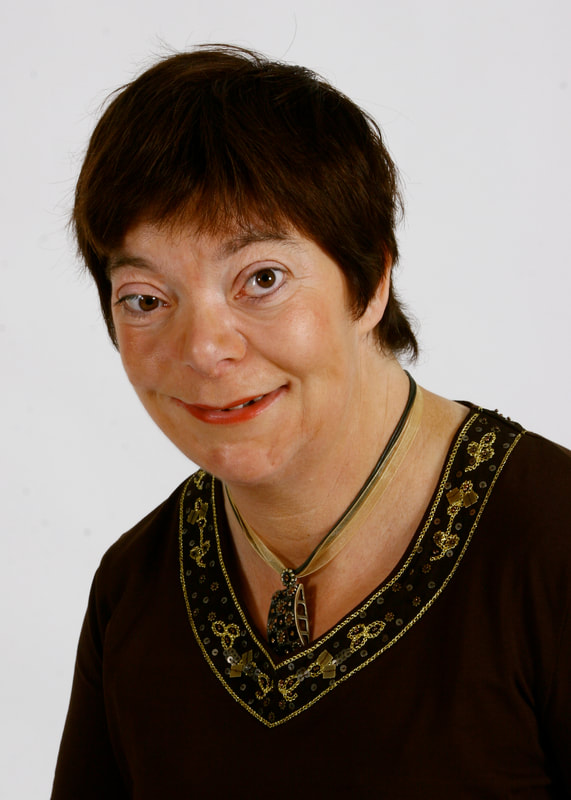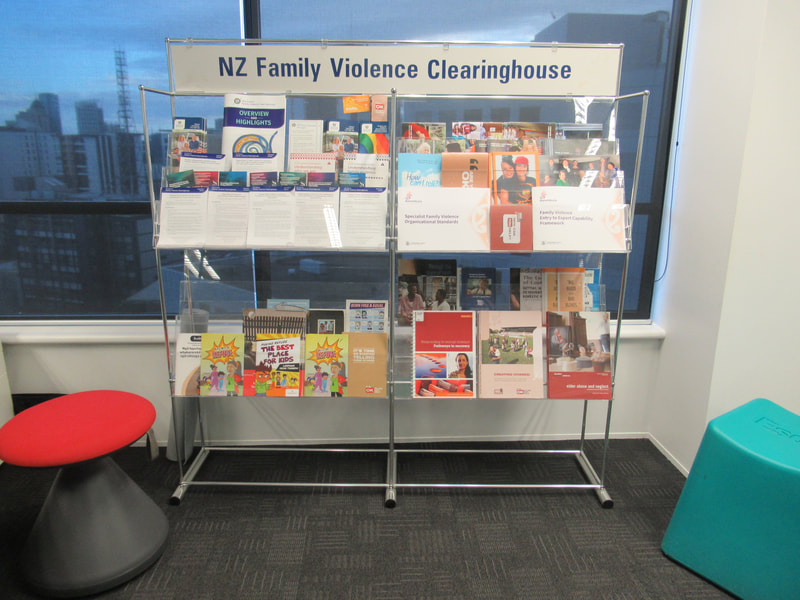Gay Richards
Gay Richards is the information specialist at the New Zealand Family Violence Clearinghouse, the national centre for family, whānau and sexual violence research and information, based at the University of Auckland.
TELL US ABOUT YOUR BACKGROUND
I was born in Auckland, where I live now. I’m Pākēhā with English and Scottish roots and family connections in Australia. During my childhood, I lived on a yacht gaining a love for the sea and travel. I completed the Diploma in Librarianship at Victoria University of Wellington in 1983, doing further study to upgrade to the Master of Library and Information Studies in 2002.
My first professional role was managing the Nursing Library at Wellington Hospital – everything was paper-based including the CINAHL index. While on OE in London, I worked as a library assistant at Lazard Brothers, a merchant bank and McKinsey & Co, management consultants - interesting times amidst the 1987 crash.
Returning to Auckland I had my sights set on a corporate library job. I landed one in the then NZI Corporation Library. Over 15 years my role transformed from librarian with a small team to information analyst with a focus on competitor intelligence, and NZI became part of IAG. There was also a brief stint at Fact Finders along the way.
After a break for more travel, the short contract I took on as information specialist in the Injury Prevention Information Centre based at the University of Auckland lasted seven years. In 2011, I became part of the New Zealand Family Violence Clearinghouse (NZFVC) team providing family violence information to researchers, students, practitioners and policymakers throughout Aotearoa New Zealand.
WHAT DOES A TYPICAL DAY LOOK LIKE IN YOUR ROLE?
Every day is different in at the NZFVC. Most days I catalogue physical or online items for our online database, respond to information requests and maintain pages on our website. I compile our monthly Pānui, which includes recent publications added to our database – it’s free if you would like to subscribe. Networking with others in the sector is an integral part of my role, and I participate in advisory groups focusing on how violence impacts disabled people, and how it can be prevented.
WHAT WAS YOUR IDEA OF BEING A LIBRARIAN WHEN YOU WERE YOUNGER?
Libraries have been part of my life since preschool. I helped in the school library throughout my school years. I always knew that I wanted to be a librarian, although I imagined it would be all about books and reading, rather than computers and websites.
ANY CAREER HIGHLIGHTS YOU’D LIKE TO SHARE WITH US?
As Librarian at NZI in the mid-1990s, I was one of the first outside the IT department to have dial up access to the internet. Being part of the team that relaunched the NZFVC in Auckland developing a website and installing the Koha library management system. Becoming an ‘embedded’ information specialist, gaining subject knowledge to better support others in their work.
TELL US ABOUT YOUR BACKGROUND
I was born in Auckland, where I live now. I’m Pākēhā with English and Scottish roots and family connections in Australia. During my childhood, I lived on a yacht gaining a love for the sea and travel. I completed the Diploma in Librarianship at Victoria University of Wellington in 1983, doing further study to upgrade to the Master of Library and Information Studies in 2002.
My first professional role was managing the Nursing Library at Wellington Hospital – everything was paper-based including the CINAHL index. While on OE in London, I worked as a library assistant at Lazard Brothers, a merchant bank and McKinsey & Co, management consultants - interesting times amidst the 1987 crash.
Returning to Auckland I had my sights set on a corporate library job. I landed one in the then NZI Corporation Library. Over 15 years my role transformed from librarian with a small team to information analyst with a focus on competitor intelligence, and NZI became part of IAG. There was also a brief stint at Fact Finders along the way.
After a break for more travel, the short contract I took on as information specialist in the Injury Prevention Information Centre based at the University of Auckland lasted seven years. In 2011, I became part of the New Zealand Family Violence Clearinghouse (NZFVC) team providing family violence information to researchers, students, practitioners and policymakers throughout Aotearoa New Zealand.
WHAT DOES A TYPICAL DAY LOOK LIKE IN YOUR ROLE?
Every day is different in at the NZFVC. Most days I catalogue physical or online items for our online database, respond to information requests and maintain pages on our website. I compile our monthly Pānui, which includes recent publications added to our database – it’s free if you would like to subscribe. Networking with others in the sector is an integral part of my role, and I participate in advisory groups focusing on how violence impacts disabled people, and how it can be prevented.
WHAT WAS YOUR IDEA OF BEING A LIBRARIAN WHEN YOU WERE YOUNGER?
Libraries have been part of my life since preschool. I helped in the school library throughout my school years. I always knew that I wanted to be a librarian, although I imagined it would be all about books and reading, rather than computers and websites.
ANY CAREER HIGHLIGHTS YOU’D LIKE TO SHARE WITH US?
As Librarian at NZI in the mid-1990s, I was one of the first outside the IT department to have dial up access to the internet. Being part of the team that relaunched the NZFVC in Auckland developing a website and installing the Koha library management system. Becoming an ‘embedded’ information specialist, gaining subject knowledge to better support others in their work.
WHO OR WHAT WOULD YOU SAY IS ONE OF THE BIGGEST INFLUENCES ON YOUR CAREER TO DATE?
Joining LIANZA, being the convenor of LIANZA SLIS North, and having a term on the LIANZA Council as Hikuwai representative, enabled me to connect with the wider library community while often working as a solo librarian. Becoming a member of the SLA (Special Libraries Association) and being a founding member of the Australian and New Zealand chapter provided international connections. I was sponsored to attend the huge SLA annual conferences in Indianapolis and had the opportunity to speak at the Solo Division lunch. I attended the Philadelphia conference too. Currently, I attend the Auckland Specialised Information Professionals meetings and LIANZA HealthSIG study days to keep in touch. Networking and luck have undoubtedly shaped my career.
IF YOU COULD RECOMMEND ONLY ONE BOOK, SITE OR RESOURCE TO SOMEONE, WHAT WOULD IT BE?
“Feel the fear and do it anyway” by Susan Jeffers if you are contemplating a career move.
WHAT WOULD YOU LIKE TO SEE LIBRARIES AND INFORMATION SERVICES LOOK LIKE IN THE FUTURE?
Although books and other resources are increasingly available online, librarians will continue to have a role as navigators to help people find the best resources. Physical libraries will continue to have a role as places where people can meet and share ideas or explore their interests on their own terms. The move to electronic resources reduces the serendipity of browsing library shelves and can limit access to published research. Unless we focus our efforts on making information freely available through open-access modes, and in printed formats where appropriate, the inequity of the digital divide will persist.
Joining LIANZA, being the convenor of LIANZA SLIS North, and having a term on the LIANZA Council as Hikuwai representative, enabled me to connect with the wider library community while often working as a solo librarian. Becoming a member of the SLA (Special Libraries Association) and being a founding member of the Australian and New Zealand chapter provided international connections. I was sponsored to attend the huge SLA annual conferences in Indianapolis and had the opportunity to speak at the Solo Division lunch. I attended the Philadelphia conference too. Currently, I attend the Auckland Specialised Information Professionals meetings and LIANZA HealthSIG study days to keep in touch. Networking and luck have undoubtedly shaped my career.
IF YOU COULD RECOMMEND ONLY ONE BOOK, SITE OR RESOURCE TO SOMEONE, WHAT WOULD IT BE?
“Feel the fear and do it anyway” by Susan Jeffers if you are contemplating a career move.
WHAT WOULD YOU LIKE TO SEE LIBRARIES AND INFORMATION SERVICES LOOK LIKE IN THE FUTURE?
Although books and other resources are increasingly available online, librarians will continue to have a role as navigators to help people find the best resources. Physical libraries will continue to have a role as places where people can meet and share ideas or explore their interests on their own terms. The move to electronic resources reduces the serendipity of browsing library shelves and can limit access to published research. Unless we focus our efforts on making information freely available through open-access modes, and in printed formats where appropriate, the inequity of the digital divide will persist.


